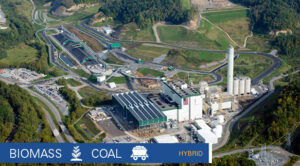by Steve Haner
The economic decision on whether and when to cut and run from a losing investment is always complicated. The debate over the future of Dominion Energy Virginia’s economically failing coal plant in Wise County will be complicated by power politics.
The State Corporation Commission has been asked to accept an agreement between the utility, the Office of the Attorney General and environmental opponents of fossil fuel generation to consider closing the plant in just a few years. The stipulation calls for a report later this year on the economic cost and benefits of pulling the plug as soon as 2026.
Dominion has been proposing to operate the plant, which opened in 2012, until at least 2045. Legally it can, despite the move away from fossil fuels in recent state laws. In the pending matter before the SCC, it continued to argue Wise County should stay open despite the economic losses.
The economic costs either way will fall mainly on the company’s customers. We have been subsidizing the operation of the money-losing plant as it sank into red ink. But if the decision is made to close it, the utility will seek to recover – from its customers – the $1.6 billion of outstanding investment it has in the facility. Heads they win and tails we lose.
That’s how we do electric power regulation in Virginia. It was the General Assembly that mandated construction of the plant, far outside Dominion’s service territory, in 2007 legislation riddled with political trade-offs. The investment would never have been found reasonable and prudent by the SCC absent legislative interference, but was deemed “in the public interest” by law.
A new bill just introduced by Delegate Terry Kilgore, R-Gate City, would directly prevent the closure of the plant “before such unit reaches the end of its useful life.” None of his Southwest Virginia constituents are Dominion ratepayers. His constituents are on the receiving end of the subsidies involved in propping up the plant.
The problems with the Virginia City Hybrid Energy Center (VCHEC) are economic, not technical. The 600-megawatt generating facility can burn coal, the troublesome waste left over from coal mining, and even biomass (trees). The company continues to claim it is the cleanest coal plant in the country, but also admits it is losing money steadily.
Dominion recovers its capital and operating costs for the plant, which employs 500 people in an economically depressed region, through a rate adjustment clause or “rider” on monthly bills. It was the routine request to update that Rider S that gave the environmental opponents a chance to make their case that the plant is economically unviable.
Understand that the environmental groups are upset mainly over the continued emissions of carbon dioxide from the plant, but that doesn’t make their economic analysis wrong. Unfortunately, and this remains infuriating, much of the financial information they developed is redacted and remains secret.
“I conclude that VCHEC lost hundreds of millions of dollars over the past three years, from 2018 to 2020, and will continue to lose millions every year through at least 2030,” wrote Sierra Club witness Rachel Wilson in sworn testimony. “Given these results, and Dominion’s own analyses, the Company has failed to demonstrate that continued investment in this unit is a prudent decision, that it should be given recovery of capital expenditures intended to prolong the life of these units, and that the unit provides any value to its ratepayers.”
But her testimony is riddled with black ink covering redactions and supplemented by a secret appendix. Likewise, much of Dominion’s financial data on the case file is confidential. Ratepayers have no right to know, apparently. We just get to pay. This must also change.
Some numbers are on the public record. Dominion itself published a projection of additional losses ranging from $350 to $480 million by 2030. It uses a complex modeling program called PLEXOS in developing its future capital spending plans to meet energy demand, and the PLEXOS model advised shutting the Wise County plant in 2023. Yet Dominion’s existing integrated resource plans maintain it.
Dominion remains a part of the regional PJM Interconnect system, which sets hourly market prices for power on a competitive basis. Coal plants are most efficient when they run fairly steadily, but often the price paid for electricity from Wise County is well below the operating cost. As recently as 2017 the plant ran about 62% of the time. Other years it has been about 25% or less.
Yet we ratepayers continue to pay steadily to retire the capital investment on the almost-idle plant, which is one of those which continue to earn the utility a profit bonus of an additional one percent of return on equity (currently 10.35%).
Dominion cites the environmental benefit of burning off that coal mining residue and the tax and job benefits to the Southwest Virginia region from the plant as justification for keeping it open. It is happy to spend ratepayer dollars from elsewhere in Virginia to prop up that local economy. It also argued that the plant might be vital when the day comes that solar and wind generation are failing to carry the load. Yes, but other options (mainly existing natural gas) better provide that cushion.
The pending stipulation at the SCC will allow Dominion to collect the Rider S money it sought for two more years, but prohibits any capital expenditures aimed at maintaining the facility long-term. It also calls for the coming report to consider alternative uses for the site, including renewable generation or a battery location.
Will the 2022 General Assembly bring any actual changes to the politically and contribution-driven energy regulatory system in Virginia? The bill from Del. Kilgore falls right in line with the bad bills from previous sessions and continues the history of top-down control by the legislature without regard to economic reality. Kilgore is now House Majority Leader.



